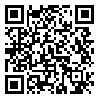Volume 28 - Supplementary
IBJ 2024, 28 - Supplementary: 295-295 |
Back to browse issues page
Download citation:
BibTeX | RIS | EndNote | Medlars | ProCite | Reference Manager | RefWorks
Send citation to:



BibTeX | RIS | EndNote | Medlars | ProCite | Reference Manager | RefWorks
Send citation to:
Ramezani T, Rafi A, Pourhanifeh M H, Farzaie N, Golchoub G. Effect of Escape Rooms in Enhancing Students' Motivation and Commitment to Learning Medical Concepts: A Systematic Review. IBJ 2024; 28 :295-295
URL: http://ibj.pasteur.ac.ir/article-1-4730-en.html
URL: http://ibj.pasteur.ac.ir/article-1-4730-en.html
Tayebeh Ramezani 
 , Alireza Rafi *
, Alireza Rafi * 
 , Mohammad Hossein Pourhanifeh
, Mohammad Hossein Pourhanifeh 
 , Noosha Farzaie
, Noosha Farzaie 
 , Ghazaleh Golchoub
, Ghazaleh Golchoub 


 , Alireza Rafi *
, Alireza Rafi * 
 , Mohammad Hossein Pourhanifeh
, Mohammad Hossein Pourhanifeh 
 , Noosha Farzaie
, Noosha Farzaie 
 , Ghazaleh Golchoub
, Ghazaleh Golchoub 

Abstract:
Introduction: Escape rooms are cooperative games involve solving clues, logical puzzles, and completing various tasks within a limited time frame. However, their effectiveness in teaching medical concepts has not been thoroughly investigated. Therefore, this study aimed to explore the role of escape rooms in enhancing students' motivation and commitment to learning medical concepts.
Search Strategy: This review study was conducted by searching the WOS, SID, Scopus, PubMED, and the Google Scholar search engine with keywords “medical concepts”, “escape room”, and “promotion of motivation” from 2020 to 2023.
Results: Various studies showed that educational escape arcades were team-based, live-action games designed to teach both general knowledge and specific content-related skills. The objective of these games was to escape from a physical room or to locate a hidden object. Created for educational purposes, their primary advantage lies in enhancing students' participation and motivation to engage with the curriculum. Research indicates that educational escape rooms can positively influence the educational escape rooms can positively influence students' motivation, with statistically significant improvements observed in post-game test scores. Feedback from surveys were used to refine subsequent versions of the software and game design. Additional studies demonstrated that the quantitative results showed a significant enhancement in class engagement, academic performance, and classroom atmosphere, as well as improved score in social and antisocial behaviors. Qualitative findings further elucidate these results and support this conclusion. Given the versatility of escape rooms, they may also serve as effective team-building tools in healthcare settings.
Conclusion and Discussion: Escape rooms effectively enhance knowledge across various subjects, and students of all types welcome their use. However, there is a need for further research to evaluate the ideal group size for using escape rooms in educational settings. Additionally, more rigorous study designs are necessary to determine the effectiveness of escape rooms in producing learning-focused outcomes, as well as greater consensus on appropriate theoretical frameworks that can be implemented and implemented. A comprehensive guide for study is also needed.

Search Strategy: This review study was conducted by searching the WOS, SID, Scopus, PubMED, and the Google Scholar search engine with keywords “medical concepts”, “escape room”, and “promotion of motivation” from 2020 to 2023.
Results: Various studies showed that educational escape arcades were team-based, live-action games designed to teach both general knowledge and specific content-related skills. The objective of these games was to escape from a physical room or to locate a hidden object. Created for educational purposes, their primary advantage lies in enhancing students' participation and motivation to engage with the curriculum. Research indicates that educational escape rooms can positively influence the educational escape rooms can positively influence students' motivation, with statistically significant improvements observed in post-game test scores. Feedback from surveys were used to refine subsequent versions of the software and game design. Additional studies demonstrated that the quantitative results showed a significant enhancement in class engagement, academic performance, and classroom atmosphere, as well as improved score in social and antisocial behaviors. Qualitative findings further elucidate these results and support this conclusion. Given the versatility of escape rooms, they may also serve as effective team-building tools in healthcare settings.
Conclusion and Discussion: Escape rooms effectively enhance knowledge across various subjects, and students of all types welcome their use. However, there is a need for further research to evaluate the ideal group size for using escape rooms in educational settings. Additionally, more rigorous study designs are necessary to determine the effectiveness of escape rooms in producing learning-focused outcomes, as well as greater consensus on appropriate theoretical frameworks that can be implemented and implemented. A comprehensive guide for study is also needed.

| Rights and permissions | |
 |
This work is licensed under a Creative Commons Attribution-NonCommercial 4.0 International License. |





.png)
